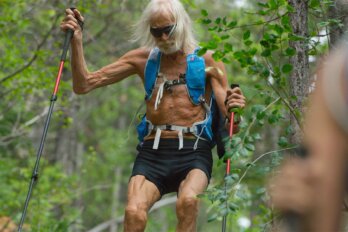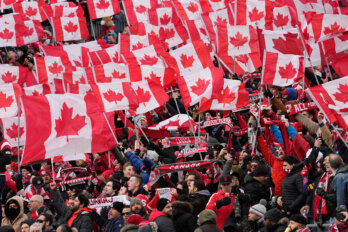The most exciting sporting event I’ve ever witnessed was the conclusion of a high school girls’ basketball tournament at Vancouver’s John Oliver Secondary School, where scenes from the Netflix drama Riverdale happen to be filmed (though shooting for the series was recently suspended due to concerns over COVID-19).
I don’t know any students at John Oliver Secondary, but I play basketball in the main gym on Friday nights and have done so for almost four years, since I moved to the West Coast. A ragtag assortment that includes over-the-hills and weekend warriors, we had been relocated to the secondary gym as a result of the tournament. Some of our players are legitimately good, but most of us are just happy if we make a shot or two, don’t flub too many layups, and don’t get injured. It took me almost a year to realize that the man I was frequently matched up against happened to be the actor who plays Principal Weatherbee on Riverdale. And let me tell you: Principal Weatherbee shoots a nice turnaround jump shot.
I don’t remember a single thing about our evening game—who won, how I played, what happened—but I very clearly recall a group of us walking past the main gym on the way out to our cars. What did we see? A packed gym, a tight game. We loitered by the entrance, drawn in by the energy. And we stayed for the final minutes, the frenetic full-court dashes, a buzzer-beating shot from outside the three-point line that was legitimately more exciting than any professional basketball play I’ve seen—in person or on a screen—and I’ve watched thousands of hours of basketball.
The fans screamed and leaped to their feet. Some were crying. I was transfixed. What a shot, what a conclusion. I had spent hundreds of hours in this gym without experiencing anything so powerful as the final play of this game. The physical space of the gym is unimpressive: the floor is often dusty, the bleachers are old. The buzzer-beater was an amazing and skilful shot, yes, but the people witnessing the buzzer-beater, the fans, transformed the space into a sanctuary of deeply shared human experience.
Now, as we consider the empty sports arenas around the world, as the NHL and NBA and NFL ask players to self-quarantine, as all-star athletes like Rudy Gobert and Donovan Mitchell are testing positive for COVID-19, how should sports fans react? The season after their team’s first NBA championship, as their search for a second is cut short, how do Toronto Raptors fans react? How do Edmonton fans react when their beloved Oilers, so close to making the playoffs, rest idly in the purgatory of a suspended season?
At first, the NBA and NHL announced that some games would take place in empty arenas. Athletes were skeptical. What is a buzzer-beater if no one is present to witness it? Would hockey fights take place without fans in the stands screaming for blood? What is March Madness without the pep bands and face paint and tears and joy, the collective gasps and communal silence, the shared hope, anxiety, and cathartic release?
Even the makeshift dodgeball tournament I participated in at Forward Operating Base Robinson, in Helmand province, Afghanistan, during the Canadian intervention in 2006, had some people in attendance. Members of the Afghan National Army and the Canadian military—joined together in the physical bounds of the Hesco military fortifications and barbed wire but separated by language and culture—stood and watched. When a ball struck one soldier in his groin, the groaning transcended into the universal language of pain.
A couple of years ago, an old tree-planting friend and I saved up for a vacation and went arena hopping. From childhood, we had both loved the NBA, and growing up in Canada, watching the Raptors on television, this trip had been our dream. We watched LeBron throw down a ferocious dunk in Cleveland; we drank arena beer in Detroit; we searched for deep-dish pizza in Chicago. And, in every arena, we cheered and laughed and booed along with everyone else. We were outsiders, but inside the joyful motion of the arena, we felt like we belonged.
And now, the arenas are shuttered. A few weeks ago, members of the Utah Jazz were quarantined for several hours within the Oklahoma City arena. Our world is changing—whether from climate change or COVID-19. So many of us feel the changes in our bones, and many of the things we have long loved and taken for granted—sports, gatherings, live music—are being paused or taken away.
A friend of mine, who had been in prison for many years and lived in Vancouver’s Downtown Eastside, loved hockey. He passed his evenings screaming joyfully at the television as the Maple Leafs scored (or didn’t), as the drama unfolded in the arena on the screen in front of him. He passed away recently, and the loss of evening hockey would have devastated him. People watch sports for a variety of reasons: because we love the game, because we want to belong, because we are lonely, because the familiar voices of the announcers remind us of our childhoods or the homes we wanted.
Obviously, not everything about professional sports is positive. I remember watching the so-called Malice at the Palace brawl, in which fans and players of the Detroit Pistons and Indiana Pacers fought in the stands. On top of indiscriminate violence, there have also been racist incidents in sports arenas around the world. Arena construction itself often has a negative effect on the most vulnerable members of our society. When the new Oilers arena opened in downtown Edmonton, for example, low-income residents of a nearby housing complex were forced to move after the Oilers Entertainment Group purchased their building. The owners of sporting franchises are often billionaires and can seem more concerned about dollars and cents than sports or community even as their operations are subsidized by public funds.
And yet, sports bring hope to so many people, including those who are marginalized by society. For those of us watching on television or from within an arena, sports in their totality, at their best, often feel like a place we know and where we are known. A couple of years ago, as I was working through the aftermath of my time in Afghanistan, I moved about seven times in a period of four years. My physical surroundings were not constant, but the parquet flooring of the Boston Celtics arena, which I could return to via television forty-one times a year, felt like a constant, perhaps even like home.
My father didn’t like professional basketball. He didn’t play it where he grew up in Europe, and he had no TV on which to watch it. So, when I was a teenager, watching Michael Jordan’s Chicago Bulls defeat the John Stockon/Karl Malone Utah Jazz in 1998, my father was annoyed by how much basketball I was consuming. He insisted, quite strongly, that I go outside and turn off the television. We drove to an outdoor court in silence. It was early summer—of the calendar and of my life. The sky outside was a watery blue, deep in a way that all people from the Prairies understand, and I was being as truculent of a teenager as you can imagine. In my memory, I blocked almost every shot my father took. I was angry at missing the game, and looking back, I feel ashamed about my anger. Now, I think about that day, about my father getting older, closer today to sixty-five than forty, and I worry about him and his health. I worry about the older folks at church and about the old busker at the Thursday-evening community meal, over eighty and still biking everywhere. I worry for my sister-in-law working in a hospital and for my fiancée doing front-line care work in a Downtown Eastside drop-in centre.
For those who are already missing sports, go outside if you can. Find an outdoor hoop or a place to play shinny. Bouncing a basketball, alone, might feel strange, but it’s an opportunity to rediscover what drew you to the game to begin with. And, for those worrying about the changing world we live in, breathe in the cool air of spring. Feel the sun and wind on your face. Grieve everything that has changed and is changing. Miss the games, by all means. I certainly will. But continue to act like a human. Call a friend. Call an elder from your community and see how they are doing. Ask them about their childhood. Expand the concept of connection. Visit the places in your heart that are larger than any sporting arena, where the shuttering of a court can never touch.





